It seems we can’t find what you’re looking for. Perhaps searching can help.
Sign Up for newsletter!
Subscribe to get the latest eBook!
Hotline






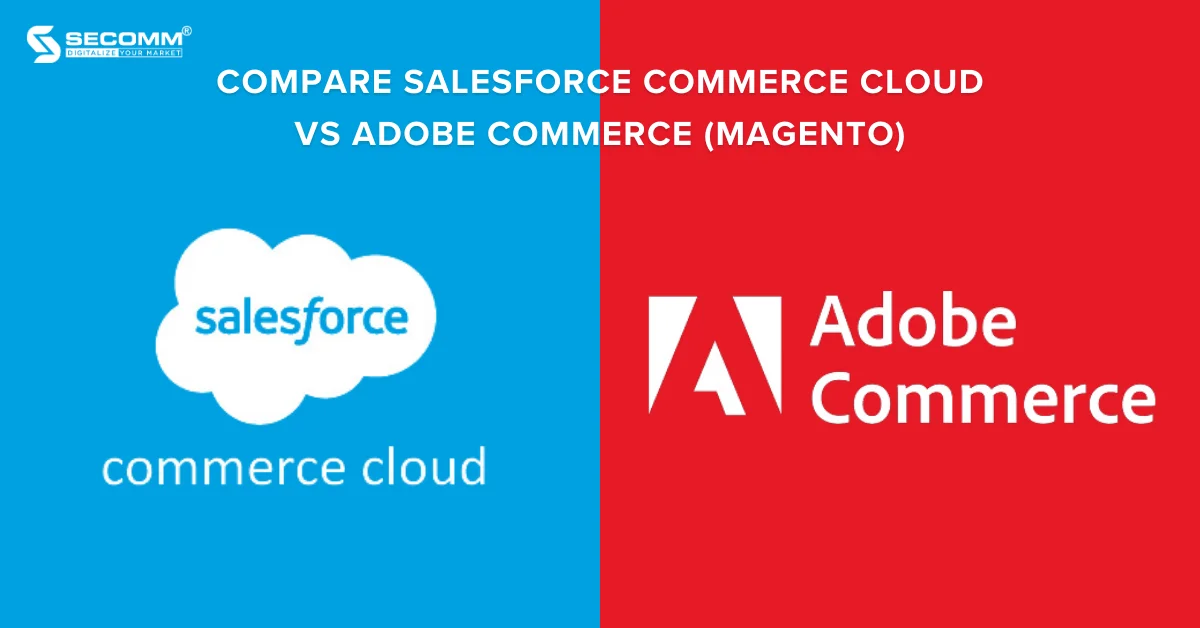
Salesforce Commerce Cloud and Adobe Commerce (Magento) are two leading platforms in the field of eCommerce, trusted by many large enterprises. However, both of these platforms have significant differences.
Let’s explore the important aspects of both with SECOMM to help businesses decide which platform is suitable for the brand’s business needs.
Salesforce Commerce Cloud, formerly known as Demandware, is a cloud-based eCommerce platform. Salesforce Commerce Cloud operates on the SaaS (Software-as-a-Service) model, providing high scalability and a range of features and capabilities to help businesses create a seamless and effective shopping experience for their customers.
Within Salesforce Commerce Cloud, there are three main editions for building eCommerce websites: Salesforce B2C Commerce, Salesforce B2B Commerce, and most recently, Salesforce B2B2C Commerce.
In the B2C model, there are three solution packages:

Similarly, the B2B model is also divided into 2 solution packages, including:
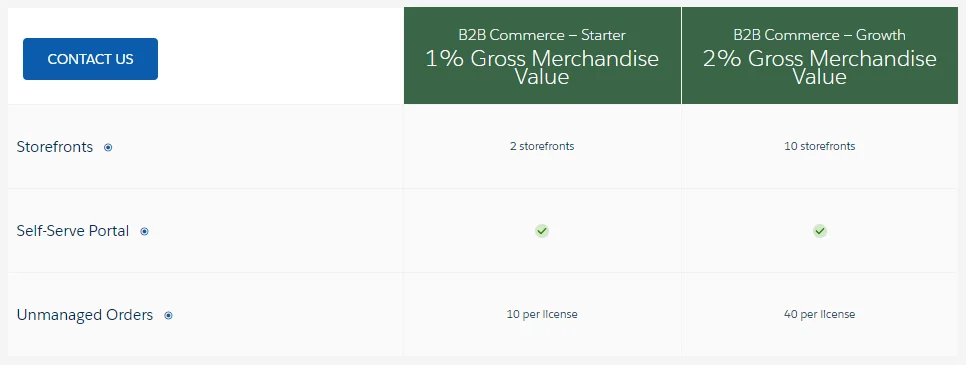
For the B2B2C model, it will be calculated based on 1% Gross Merchandise Value (GMV).
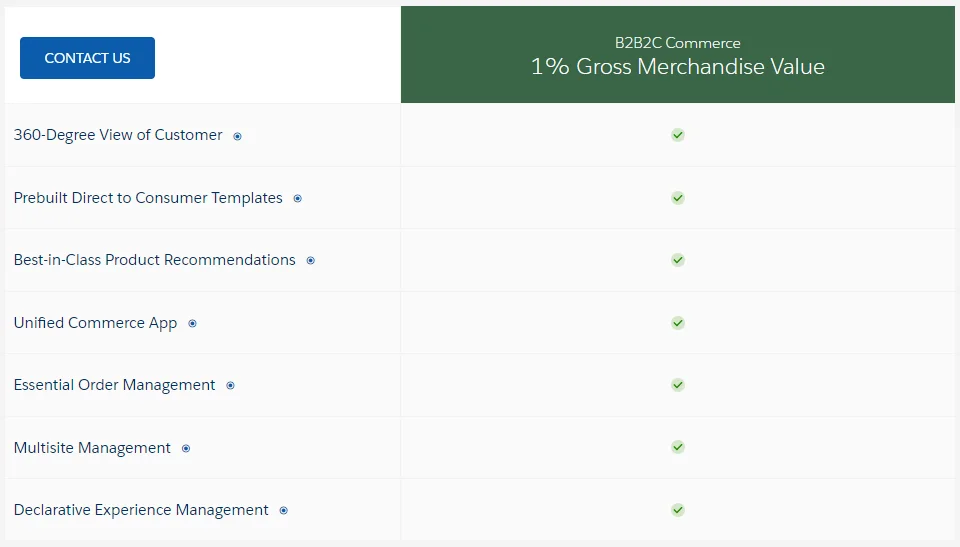
Related article: Top 10 Websites Built On Salesforce Commerce Cloud
Adobe Commerce (formerly known as Magento) is an open-source eCommerce platform designed under the PaaS (Platform-as-a-Service) model, assisting businesses in constructing professional eCommerce websites.
Adobe Commerce can be categorized into two main types:
Additionally, Adobe Commerce still supports the Magento Open Source version – a free version that can be downloaded and used by anyone.
Related article: Top 20 eCommerce Websites Using Adobe Commerce (Magento)
In summary, Salesforce Commerce Cloud and Adobe Commerce are two leading eCommerce platforms with significant differences.
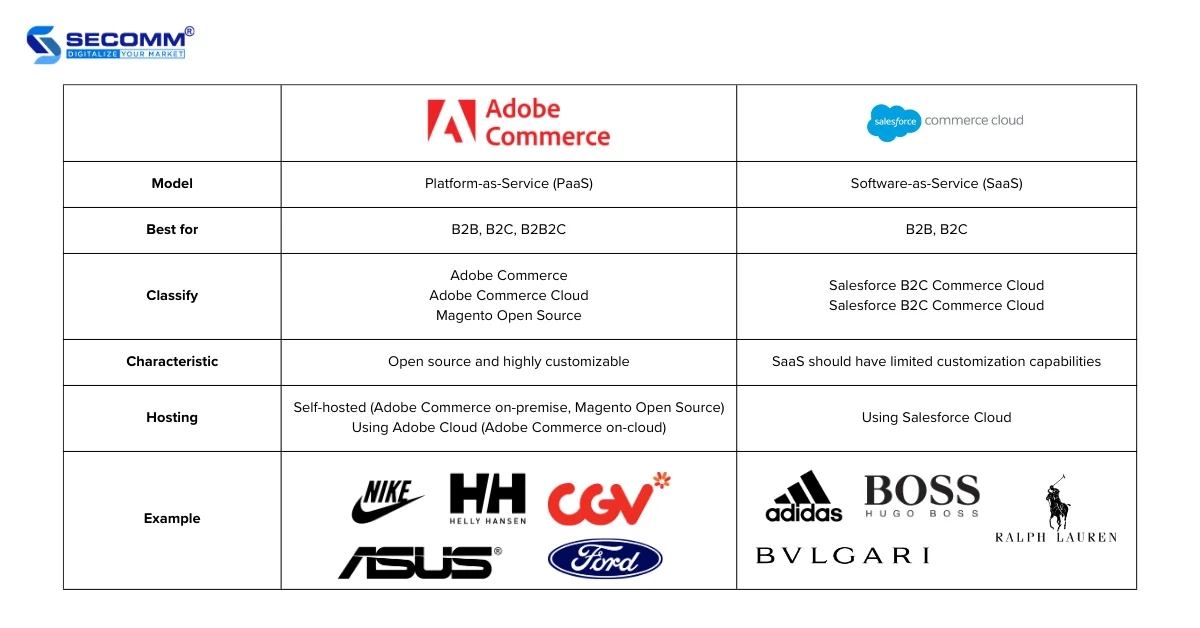
The cost of Salesforce Commerce Cloud depends on various factors but largely hinges on the scale of the business.
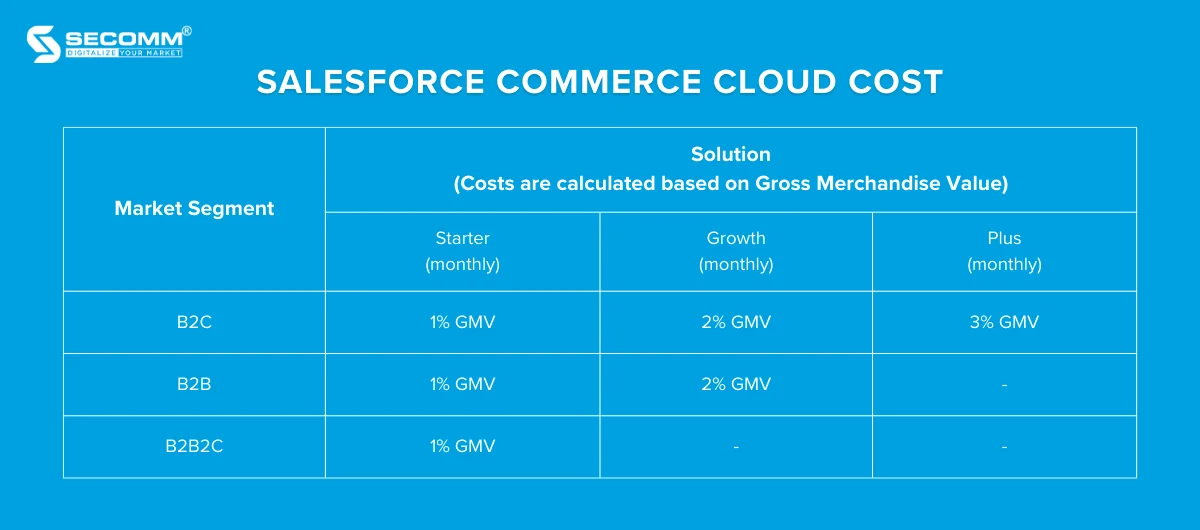
Operating as a SaaS solution, businesses pay a monthly fee based on the number of users and the revenue generated by the website. Costs start from depending on the GMV, averaging around $2,500 per month and can increase to tens of thousands of dollars for larger enterprises.
The cost of Adobe Commerce (Magento) also depends on various factors, including the chosen version and the monthly revenue of the business.
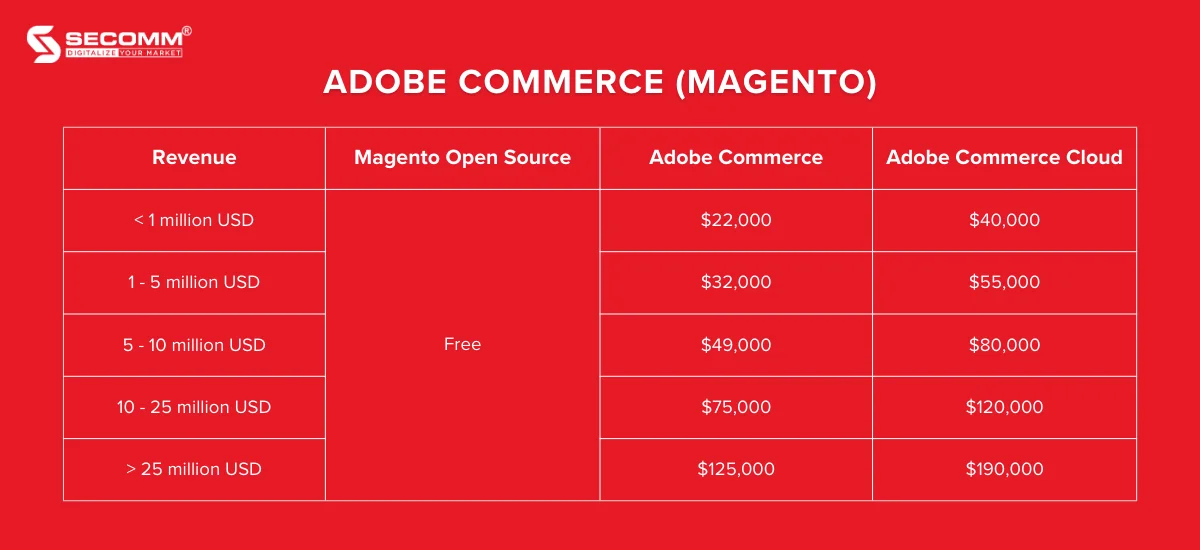
Adobe Commerce is a PaaS solution, meaning businesses must purchase software licenses annually and then pay a monthly fee for hosting and support if needed. License costs start from around $22,000, and hosting costs start from approximately $3,000 per year.
It can be observed that the costs of Salesforce Commerce Cloud and Adobe Commerce (Magento) may vary depending on the business scale, specific requirements, and customization levels.
For instance, for a business with a GMV of $25 million, the platform usage cost for Salesforce Commerce Cloud might be around $250,000/month, whereas for Adobe Commerce Cloud, it could be approximately $120,000/month.
In general, Salesforce Commerce Cloud tends to have higher costs compared to Adobe Commerce.
Related article: The Cost Of Building An Adobe Commerce (Magento) Website
Adobe Commerce (Magento) is built on an open-source architecture, allowing high customization and flexibility. Users can modify a significant amount of source code, making this platform suitable for complex eCommerce needs.
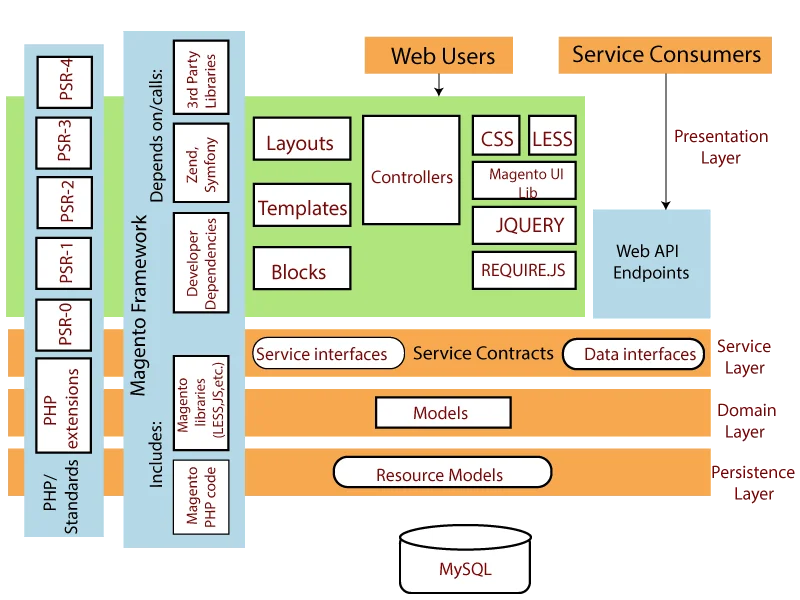
Salesforce Commerce Cloud utilizes a cloud-native, multi-tenant architecture. While this architecture provides significant customization capabilities, it is less flexible for modifying deep code segments compared to open-source architectures like Adobe Commerce (Magento).
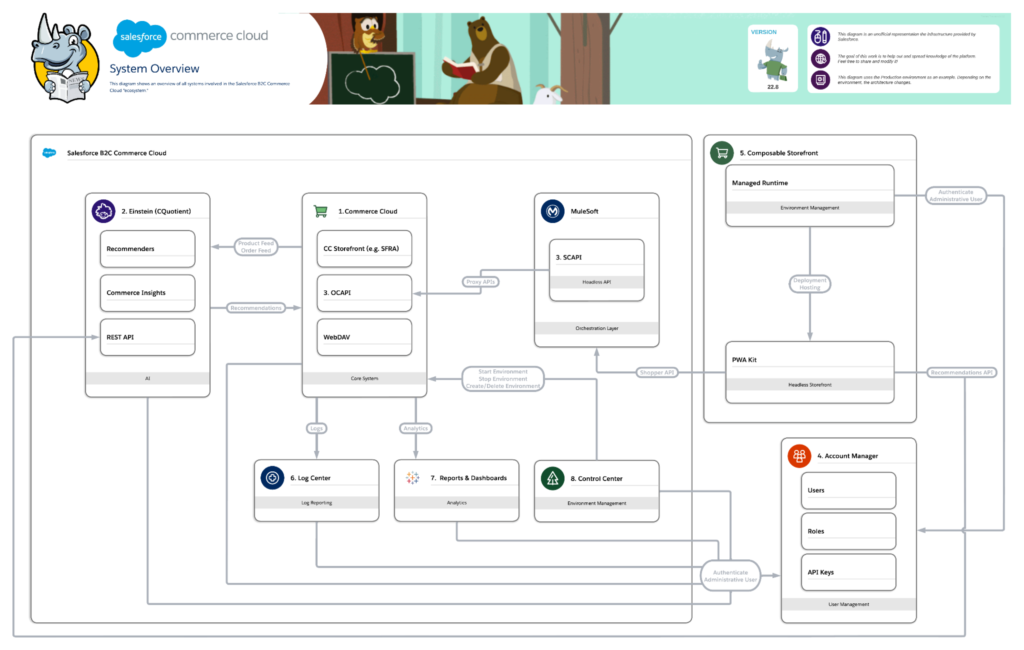
Salesforce Commerce Cloud is part of Salesforce, the leading Customer Relationship Management (CRM) platform today. Salesforce is renowned for its CRM services, including sales, customer, and marketing management.
Consequently, Salesforce Commerce Cloud seamlessly integrates with Salesforce CRM, providing a unified platform for managing and interacting with customers. This tight integration can be a significant advantage for companies heavily reliant on Salesforce for customer management.
Additionally, Salesforce Commerce Cloud seamlessly integrates with the Customer 360 ecosystem, including business management software like data, AI, or third-party utilities partnered with Salesforce.

On the other hand, Adobe Commerce Cloud is part of the Adobe Experience Cloud, a comprehensive set of solutions for marketing and customer experience.
Thus, Adobe Commerce Cloud integrates with other Adobe tools to support seamless multi-channel customer experience and marketing.
Some commonly used utilities in Adobe Experience Cloud include:
Moreover, Adobe Commerce Cloud offers various integration options and supports third-party extensions and plugins. This means Adobe Commerce can integrate with a wide range of systems such as CRM, POS, WMS, OMS, ERP, etc.
Salesforce Commerce Cloud and Adobe Commerce (Magento) are two widely used leading eCommerce platforms in the market, partially due to their incredibly powerful and diverse feature sets.
Below is a comparison of features between Salesforce Commerce Cloud and Adobe Commerce:
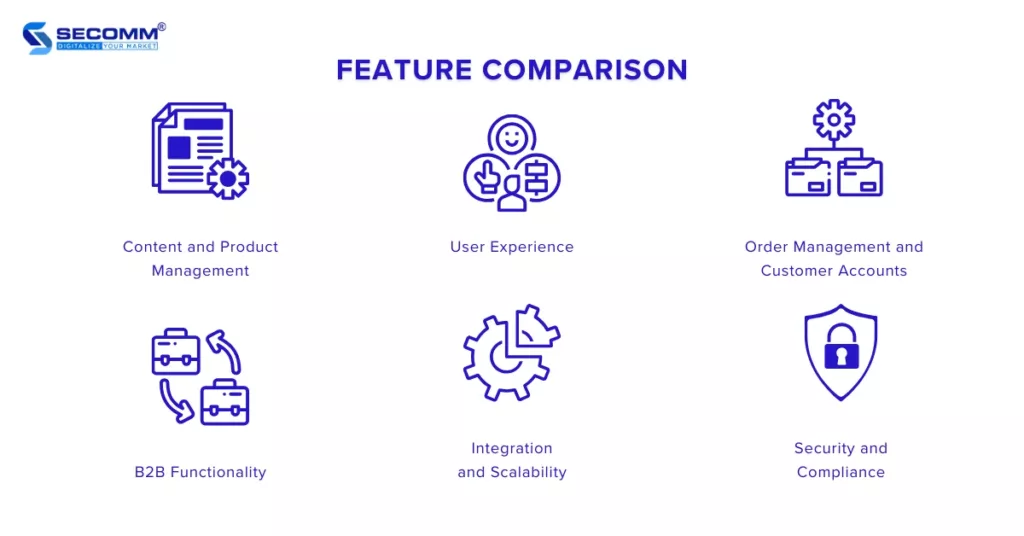
Content and Product Management:
User Experience:
Order Management and Customer Accounts:
B2B Functionality:
Integration and Scalability:
Security and Compliance:
Salesforce Commerce Cloud and Adobe Commerce (Magento) are both powerful eCommerce platforms. However, Salesforce Commerce Cloud is suitable for large enterprises seeking a tightly integrated eCommerce solution with their CRM system.
On the other hand, Adobe Commerce would be a better choice for businesses with high customization needs and a desire for more control over the eCommerce platform.
The selection of the most suitable eCommerce platform for each business will depend heavily on the core needs of the brand.
With deep expertise and the development of complex eCommerce systems for clients such as Changi Airport Group (Singapore), Trentham Estate (Australia), and The Warehouse (Vietnam), SECOMM understands the challenges in choosing a platform and deploying eCommerce that businesses are facing.
Contact SECOMM now or call directly at the hotline number (028 7108 9908) for free advice on the eCommerce website building roadmap!
 2
2
 5,025
5,025
 0
0
 1
1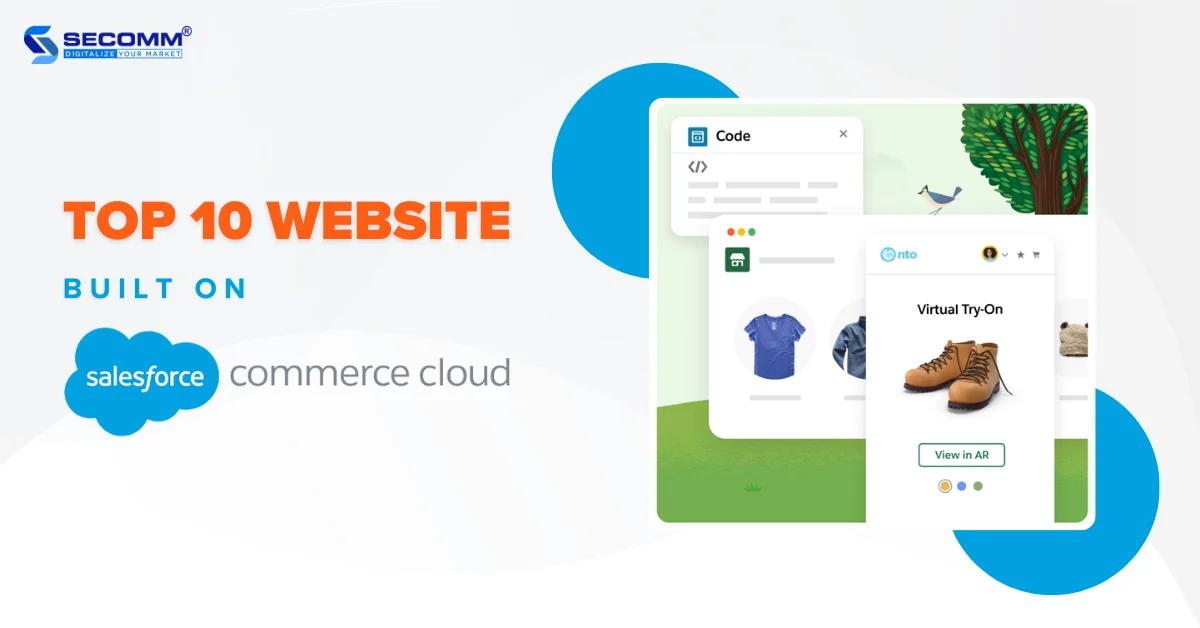
Salesforce Commerce Cloud is a scalable cloud-based eCommerce platform that enables brands to meet growing business demands.
Below is a list of the top 10 websites currently using Salesforce Commerce Cloud for reference by businesses.
Cotton:On is a well-known fashion brand from Australia, established in 1991. This brand specializes in youthful and dynamic fashion products suitable for the younger generation, including clothing for men, women, children, accessories, and travel items.
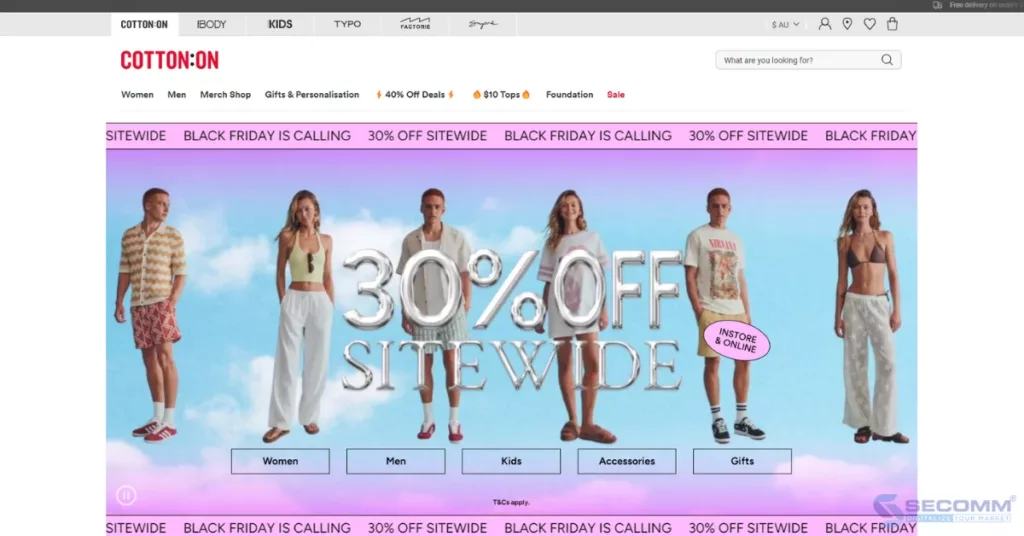
When using Salesforce Commerce Cloud, Cotton:On quickly built a multi-channel eCommerce website and activated 10 different websites globally within just 12 months.
“Salesforce has helped us scale our multi-channel capability and meet demand for more personal journeys” – Brendan Sweeney, General Manager, Cotton:On Group.
Versace is a luxury fashion brand from Italy, founded in 1978 by Gianni Versace. The brand specializes in high-end fashion products, including clothing, footwear, accessories, furniture, and fragrances.

Salesforce Commerce Cloud has helped Versace create an optimized user experience for its eCommerce website, making it easy for customers to search, shop, and make payments. The website is designed to be simple, user-friendly, and suitable for the brand’s upscale customer base.
Bvlgari is a luxury fashion brand from Italy that has used Salesforce Commerce Cloud to build its eCommerce website. This website is designed to provide an enhanced personalized shopping experience for Bvlgari’s customers.

Bvlgari has developed personalized product features that allow customers to create their own profiles and store information about their shopping preferences, purchase history, and delivery addresses. This feature helps Bvlgari better understand customer needs and provide them with personalized product recommendations and services.
Samsonite is a multinational manufacturer of luggage and travel accessories based in the United States. The company was founded in 1910 by Jesse Shwayder in Denver, Colorado, USA. Since then, Samsonite has become one of the world’s largest luggage manufacturers, with products sold in over 120 countries.

Samsonite has implemented Salesforce Commerce Cloud to enhance user experience, increase online sales, and analyze customer shopping behaviour.
Callaway Golf is an American golf equipment manufacturing company established in 1982 by Ely Callaway. The company specializes in designing, manufacturing, marketing, and selling golf equipment, specifically clubs and balls, as well as accessories like bags, gloves, and hats.

Callaway Golf has utilized the product filtering feature of Salesforce Commerce Cloud to help customers easily find products based on their needs. The brand has also employed the product recommendation feature to assist customers in discovering new products.
ECCO started as a multinational footwear business based in Denmark, founded in 1963 by Karl Toosbuy. The company specializes in designing, manufacturing, and selling shoes, bags, and other fashion accessories.

In early 2015, ECCO USA began testing the Endless Aisle, a supplementary feature of Salesforce B2C Commerce, along with other functionalities. This feature helps prevent lost sales by allowing collaborators to place orders based on online inventory.
Jimmy Choo is a luxury fashion brand from the United Kingdom specializing in shoes, handbags, accessories, and fragrances. The company was founded in 1996 by Malaysian-born haute couture shoe designer Jimmy Choo and British Vogue accessories editor Tamara Mellon.

Salesforce Commerce Cloud has helped Jimmy Choo enhance user experience, increase online sales, and analyze customer shopping behaviour. The brand has successfully leveraged Salesforce Commerce Cloud to drive the brand’s growth.
Brunello Cucinelli is a luxury fashion brand from Italy founded in 1978 by Brunello Cucinelli. The company is known for its cashmere sweaters, tailored suits, and other high-end fashion items.
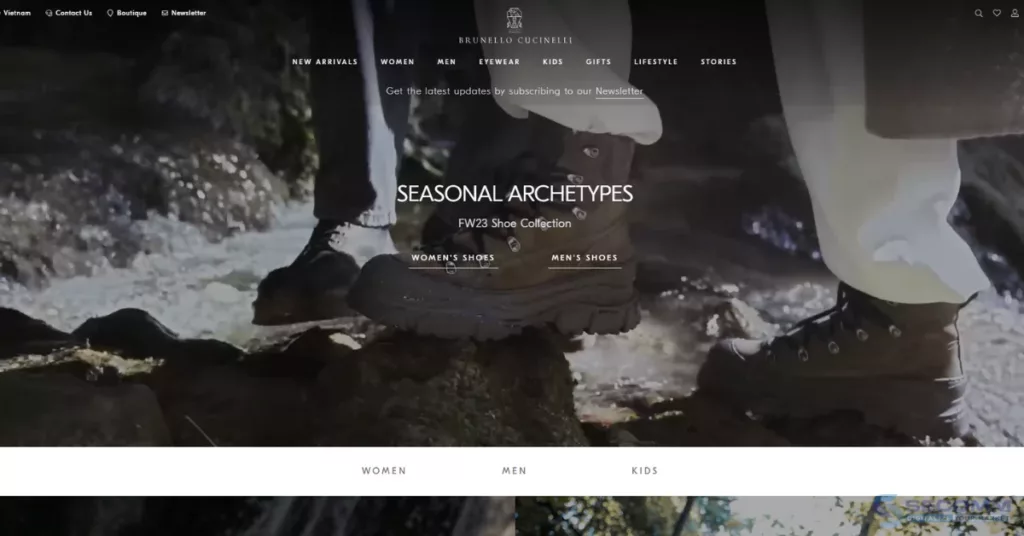
Brunello Cucinelli has utilized Salesforce Commerce Cloud to build an eCommerce website with features supporting user experience and boosting online sales.
GODIVA is a premium chocolate brand from Belgium, established in 1926 by Pierre Draps. The company specializes in high-quality chocolate made from the finest ingredients and crafted using traditional methods.

Salesforce Commerce Cloud has helped GODIVA analyze customer shopping behaviour. This data is utilized to enhance the customer shopping experience, develop new products and services, and optimize marketing strategies.
Toys”R”Us is a leading retailer of toys, games, entertainment, and educational products in Asia. Headquartered in Hong Kong, the company operates over 470 stores with more than 10,000 members across Asia, including Brunei, China, Hong Kong, Macau, Taiwan, Japan, Malaysia, Singapore, the Philippines, and Thailand.
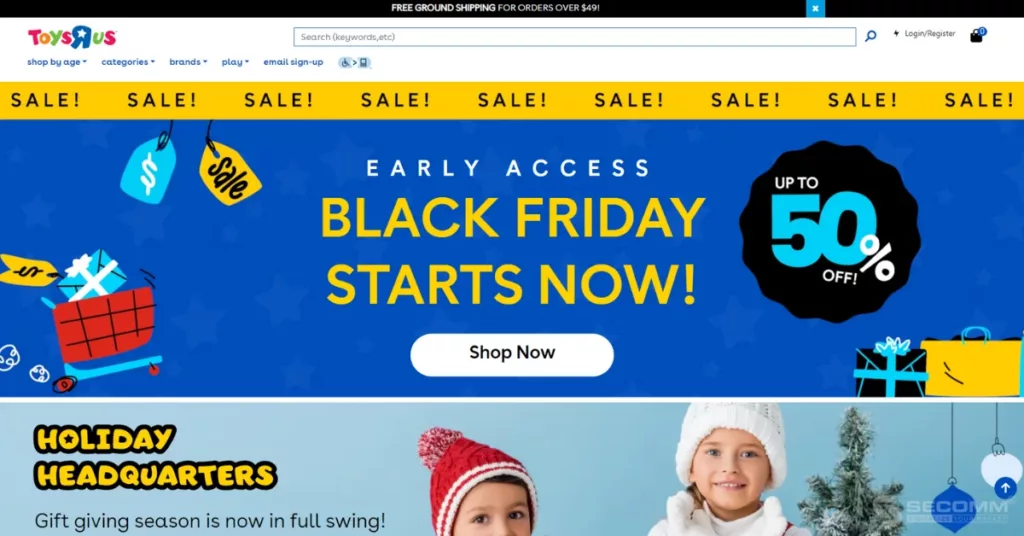
Tim Halaska, Regional Manager for Digital Strategy at Toys”R”Us Asia, acknowledges that traditional stores will always have a certain place in the company. However, COVID-19 and changes in consumer preferences have led to a more significant focus on eCommerce.
The Salesforce Commerce Cloud solution has helped Toys”R”Us streamline online sales and provide a unified experience that caters to consumer needs across Asia.
“Our challenge now is to capture the magic of that in-store experience and bring it online.” – Tim Halaska, Regional General Manager Of Digital Strategy, Toy”R”Us Asia.
Above are the top 10 websites built by Salesforce Commerce Cloud that have achieved success in both brand recognition and revenue. This success serves as inspiration for other businesses seeking the most suitable solutions to compete in the market.
With deep expertise and the development of complex eCommerce systems for clients such as Changi Airport Group (Singapore), Trentham Estate (Australia), and The Warehouse (Vietnam), SECOMM understands the challenges in choosing a platform and deploying eCommerce that businesses are facing.
Contact SECOMM now or call directly at the hotline number (028 7108 9908) for free advice on the eCommerce website building roadmap!
 2
2
 8,674
8,674
 0
0
 1
1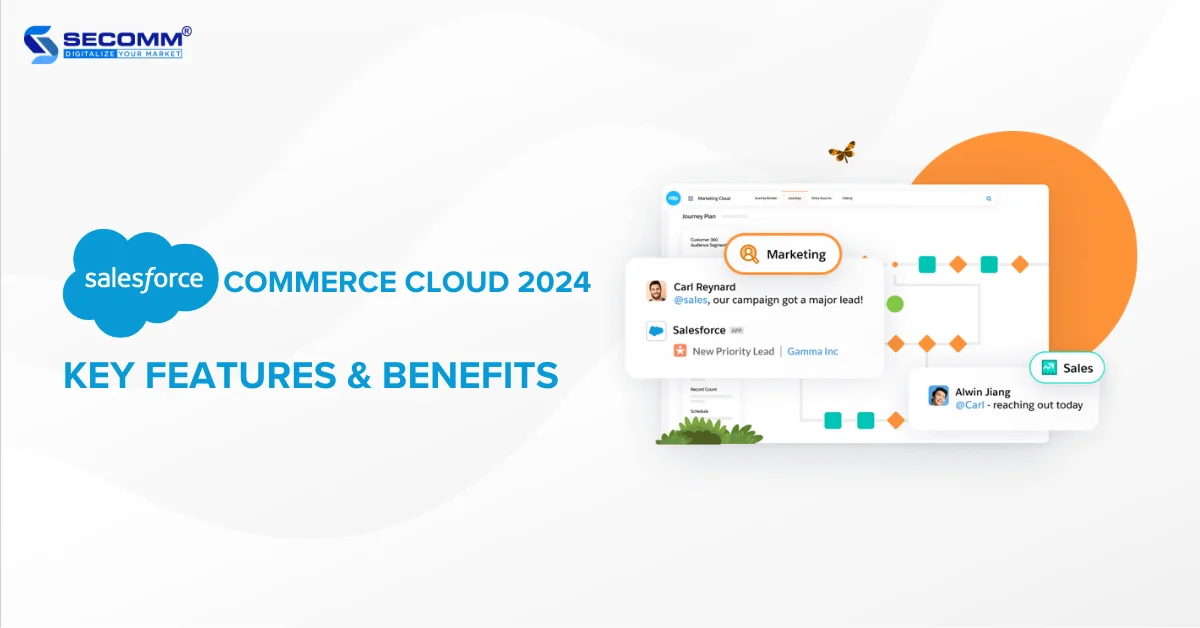
According to Builtwith, Salesforce Commerce Cloud is a platform used by over 12,000 eCommerce websites worldwide. This number has consistently increased over the years, reflecting the platform’s growing popularity.
Here is an analysis of the number of websites using Salesforce Commerce Cloud in different regions:
The United States is the largest country, with over 2,106 websites utilizing this platform.
Salesforce Commerce Cloud is a cloud-based eCommerce platform that helps businesses drive online sales and large enterprises.
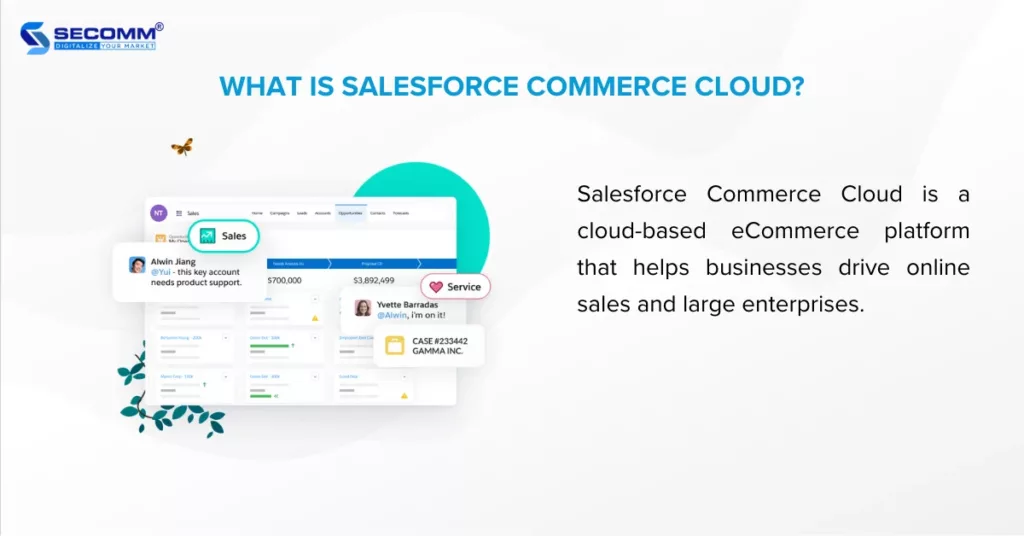
This platform provides a comprehensive set of tools to manage every aspect of eCommerce business, from product catalogue management and order fulfilment to marketing and customer service.
All static content (JS, CSS, and images) is distributed through CDN and eCDN (Embedded Content Delivery Network). Additionally, the platform can be configured to use external CDNs through the capabilities of the native platform. This ensures that platform resources are not consumed for static content. The remaining information and data will be handled by Salesforce servers. Data centres are distributed globally, placing them physically closer to end users.
In terms of structure, in such data centres, Salesforce can maintain multiple PODs (Point of Delivery). PODs allow for sharing and providing additional resources to stakeholders if there is a sudden surge in demand for those resources. PODs include firewalls, switches, load balancers, computing power, and file systems.
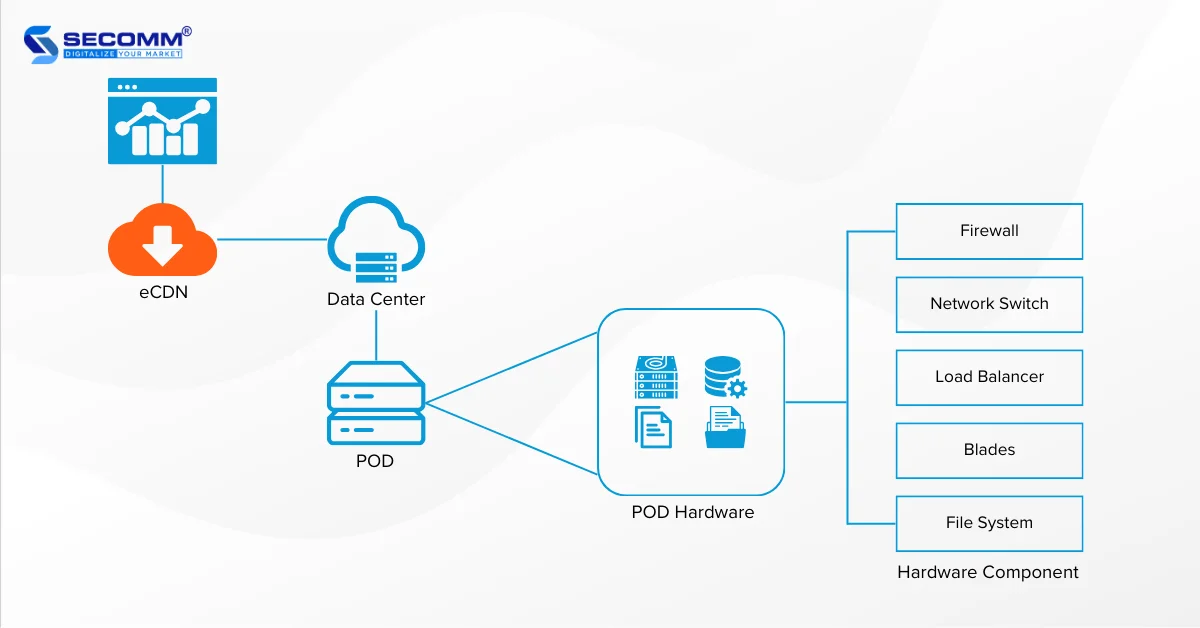
Salesforce Commerce Cloud has two main versions for building eCommerce websites: Salesforce B2C Commerce and Salesforce B2B Commerce, and more recently, B2B2C.
For the B2C model, it is further divided into three solution packages, including:

Similarly, the B2B model is divided into two solution packages, including:

For the B2B2C model, it will be calculated based on 1% Gross Merchandise Value.
Salesforce Commerce Cloud provides a range of powerful features to help businesses grow their eCommerce ventures, including:
Salesforce Commerce Cloud is one of the rare platforms that supports Headless Commerce by integrating with popular technologies and frameworks such as React, Angular, and Vue.js. This enables businesses to develop custom user interfaces tailored to the specific needs of the brand.
Related article:
In mid-2023, Salesforce introduced two new-generation AI products, including Marketing GPT and Commerce GPT, at the company’s Connections conference.
Marketing GPT and Commerce GPT empowers Salesforce’s Marketing Cloud and Commerce Cloud, allowing businesses to eliminate repetitive tasks, save time in their workflows, and deliver personalized campaigns and shopping experiences on a large scale.
With Marketing GPT, businesses can automatically generate more personalized emails and create smarter audience segments. With Commerce GPT, brands can provide personalized shopping experiences and customized promotions tailored to customer needs, utilizing the dynamic shopping journey provided by GPT.
Salesforce Commerce Cloud supports Omnichannel, meaning you can provide a seamless shopping experience across all channels, including websites, mobile apps, social media platforms (Facebook, Instagram, Zalo, etc), and eCommerce marketplaces (TikTok Shop, Shopee, Lazada, Sendo, etc).
This allows businesses to easily sell on multiple channels without the need to build and maintain separate solutions for each channel.
Salesforce Commerce Cloud is built on a cloud platform, making it easy for businesses to scale their eCommerce operations without worrying about investing in hardware and software. Salesforce Commerce Cloud also provides features and tools to help businesses efficiently manage traffic and performance, ensuring a seamless shopping experience for customers.
Salesforce Commerce Cloud is utilized by numerous large retailers and B2B enterprises worldwide to create and manage eCommerce websites, reaching a wider customer base.
Hugo Boss is one of the world’s leading premium fashion brands from Germany, established in 1924, with a widespread retail network including stores, distributors, and an eCommerce website. Hugo Boss employed Salesforce Commerce Cloud to build its eCommerce website in 2021.
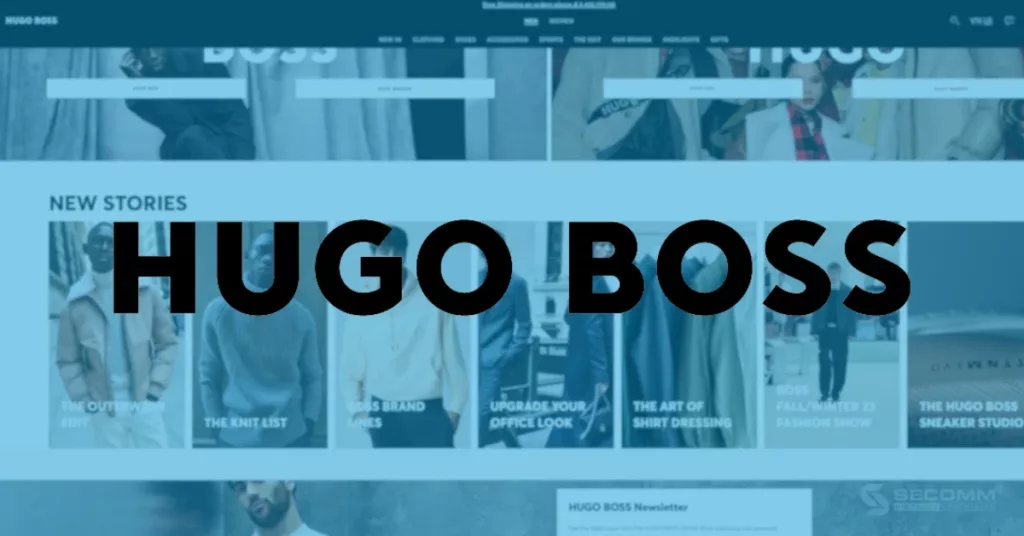
The platform provides features that help Hugo Boss create a seamless shopping experience, including synchronized product catalogues, cross-channel payments, and shipping and returns. Additionally, Hugo Boss’s website offers personalized features, such as product recommendations based on customer shopping history.
Bvlgari, a luxury fashion brand from Italy, has utilized Salesforce Commerce Cloud to develop its eCommerce website. The website is designed to enhance a personalized shopping experience for Bvlgari’s customers.

A notable personalized feature on Bvlgari’s new eCommerce website is the “My Bvlgari” feature, which allows customers to create their own profiles and store information about shopping preferences, purchase history, and delivery addresses. This feature helps Bvlgari better understand customer needs and provides them with tailored product suggestions and services.
Ralph Lauren is a premium American fashion brand founded in 1967, specializing in luxury fashion products for men, women, and children, including clothing, footwear, accessories, and fragrances.

Salesforce Commerce Cloud assists Ralph Lauren in synchronizing its product catalogue across all channels, including the website, mobile app, and physical stores. This ensures that customers can easily find the products they want to purchase, regardless of the channel they are using.
Salesforce Commerce Cloud is a powerful and flexible eCommerce platform, particularly well-suited for large enterprises to conduct online business more efficiently.
Related article: Top 10 websites built on Salesforce Commerce Cloud
With deep expertise and the development of complex eCommerce systems for clients such as Changi Airport Group (Singapore), Trentham Estate (Australia), and The Warehouse (Vietnam), SECOMM understands the challenges in choosing a platform and deploying eCommerce that businesses are facing.
Contact SECOMM now or call directly at the hotline number (028 7108 9908) for free advice on the eCommerce website building roadmap!
 2
2
 7,402
7,402
 0
0
 1
1Subscribe to get the latest eBook!
Hotline